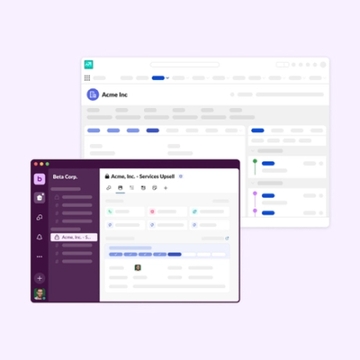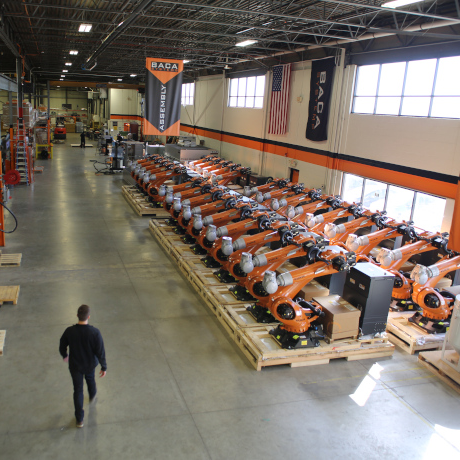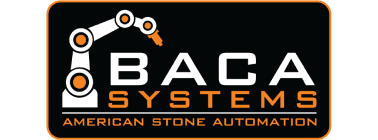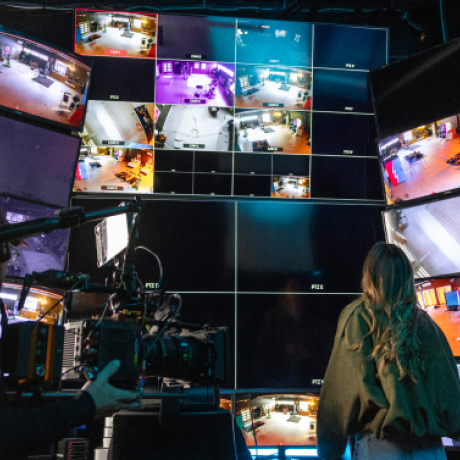About Devolutions
Making secure access and remote connections effortless for IT teams
Founded in Canada in 2010, Devolutions provides remote connection and privileged access management solutions to over one million SMB and mid-market users across 140 countries. Its tools make it easy for IT teams to manage access, passwords, and remote connections — securely and without the usual complexity. Through ongoing investments in open-source collaboration and intelligent automation, Devolutions is building a sustainable technology ecosystem that supports IT professionals worldwide.

“Slack is our operating system for everyone, every day. We use canvases, automations, AI, and more to bring as much of our day-to-day work into Slack as possible. It’s the single pane of glass where everything happens.”
The challenge
Too many tools, too little flow
As a growing software company, Devolutions faced a familiar challenge: operational complexity with legacy tools. With teams spread across tools for communication, project tracking, and incident response, collaboration often felt fragmented. Conversations lived in one place, while decisions and context lived somewhere else.
“We needed something that brought work back together,” said Simon Chalifoux, IT Director at Devolutions. “Too many tools created too much distance between people and the actual work.”
The engineering teams needed faster, more natural ways to communicate and ship value to customers without constantly switching contexts between Jira, Monday, Outlook, Teams and other platforms. And as AI experimentation accelerated across departments, from IT to legal, Devolutions wanted a simpler, more connected way to bring those workflows together.
“Slack is where work happens. It’s where the company breathes.”
How Devolutions works better with Slack
Slack is the company’s de facto business operating system.
Devolutions began integrating Salesforce and Slack in 2021, and Slack-first processes are now foundational across RevOps: In the last month alone, teams actively used 42 custom workflows and 60 app integrations, including Confluence, Jira, Outlook Calendar, Zapier, and Miro. Service Cloud for Slack is one of the most heavily used integrations company-wide, underscoring Devolutions’ focus on using Slack to drive real operational efficiency.
While Microsoft remains central for email and meetings, Slack is where work comes together, linking people, projects, and data from across the company’s ecosystem. The two platforms work hand in hand: Slack’s Outlook integration connects calendars and communications, automatically syncing status updates, sending reminders, and letting teams join Microsoft Teams meetings directly from Slack.
To centralize planning and execution, every project at Devolutions has its own Slack channel and canvas, replacing the need to lean on other tools. In the engineering department, teams use huddles for ad-hoc collaboration. “Huddles make it easy for everyone to jump in and keep the conversation moving, plus multiple people can share their screen at the same time,” Chalifoux said. “It feels effortless.”
Beyond daily workflows, Devolutions also uses Agentforce, leveraging Slack as the single, intelligent layer that unites systems and conversations across the business. Employees follow the channels that matter to them, and culture shows up in the details, from custom emoji to team rituals that keep people connected.
“If you’re not on Slack, you’re not in Devolutions,” Chalifoux said.
Building an AI-forward culture
Slack is also the easiest environment for the company to experiment with AI. In the last month, 89% of employees used Slack’s AI-powered recaps, summaries, or searches, saving the company an estimated 800 hours — or 100 full working days.
Instead of building standalone prototypes or forcing employees to learn new systems, Devolutions builds its custom agents, then deploys them directly inside Slack, where work already happens. The result is fast, practical experimentation and real adoption across teams.
Two examples show how Devolutions is using these custom-built AI agents to automate complex workflows and push the boundaries of what Slack — and its employees — can do.
Turning incident chaos into instant insight
When security or operational incidents occur, Devolutions’ incident response happens entirely in Slack. The Post-Mortem Agent automates one of the team’s most tedious jobs: compiling the full chronology after an incident.
Triggered with a simple slash command in a private incident channel in Slack, the agent processes the entire conversation, builds a formatted post-mortem report, pulls related customer cases from Salesforce Service Cloud, and posts the final document to a private Jira work item.
“The incident manager used to spend hours building that chronology,” Chalifoux said. “Now the agent does it automatically in Slack.”
When your AI agent doubles as a paralegal
Built for the legal department, the Deep Research AI agent reviews vendor terms and conditions. From Slack, legal professionals upload a document or link, and the agent — built in C# on .NET using OpenAI — returns answers to 10–15 key compliance questions directly in Slack.
“All this happens where the legal team already works,” said Chalifoux. “They trigger it, it processes in the back end, and posts the results right back into Slack.”
“We’re bringing everything inside Slack, from projects to AI agents, because that’s where work happens.”
Next steps
Scaling from experiments to Agentic Enterprise
After months of company-wide AI training, Devolutions is shifting from experimentation to scale. The IT team no longer wants to be the sole builder of custom Slack agents. Instead, the company is empowering “AI champions” inside each business unit to identify high-impact use cases and design lightweight agents themselves.
“We’ve trained every employee to understand what AI can do,” Chalifoux said. “Now it’s about putting that capability in the hands of people closest to the work.”
The vision is a growing ecosystem of Slack-based agents — some built by IT, others by business users — that automate tasks, surface insights, and interact directly with teams in real time. “In the next nine months, we’ll move from a handful of AI experiments to a full ecosystem of Slack agents,” Chalifoux said. “These agents will be able to assign software licenses, summarize team updates, or even diagnose support issues, all from inside Slack.”
For Chalifoux, this shift represents a cultural evolution. “The breakthrough comes when AI isn’t something separate,” he said. “It’s built right into where we already work. For us, that’s Slack.”















